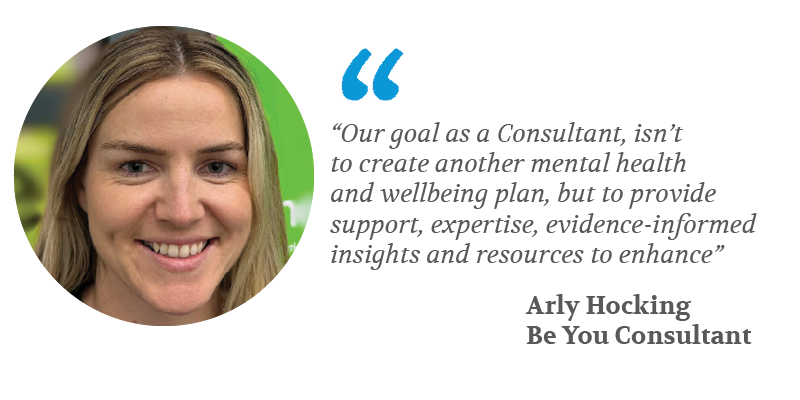October is Mental Health Month. This year’s theme, ‘Let’s Talk About It’, encourages open conversations.
Be You spoke to Eliza Nolan, Wholebeing Programs Leader and Facilitator (ELC-Year 12) and Year 2 classroom teacher at Strathcona Girls Grammar, an independent school located in Melbourne.
In addition to her classroom role, Eliza is a leader of the Wholebeing strategy which is closely aligned to the whole-school approach of the Be You Framework. The aim of the program is to create a cultural shift, embedding wellbeing into Strathcona’s curriculum from Early Learning to Year 12.
Eliza believes a whole-school, evidence-informed approach to mental health and wellbeing is essential in understanding the school community’s needs.
The Wholebeing program is supported by insights garnered from staff and student surveys. These insights measure the success of the program and ensure it accurately addresses the concerns and positive feedback of those in the community.
Eliza, who holds a Psychology degree, keeps across the latest academic research, ensuring Strathcona stays at the forefront of wellbeing best practice. Staying up to date is essential to Eliza’s understanding of the wellbeing landscape, which informs her decision-making. Eliza can then support all students and teachers to reach their full potential.
Eliza takes immense pride in ensuring Strathcona’s Wholebeing strategy remains impactful, practical and relevant. In collaboration with Be You Consultant, Arly Hocking, Eliza continues to use data-driven insights to inform strong wellbeing practices for her school community.

Eliza Nolan - Strathcona Girls Grammar School Wholebeing Programs Leader ELC-Year 12 and Year 2 Classroom
October is Mental Health Month and provides an opportunity to raise awareness of mental health and wellbeing.
We asked Eliza what a journey towards investing in mental health and wellbeing means to her:
What does Mental Health Month mean to you?
Mental Health Month is an incredibly important initiative. We know our mental health can impact our lives daily, however Mental Health Month prompts people to think about their mental health and wellbeing and encourages people to be productive in seeking support if needed. The month normalises the notion that we need to ‘exercise’ our mental health, in the same way that we do our physical health.
Mental Health Month is an opportunity to celebrate what we are already doing at Strathcona to support the wellbeing of our whole school community. The aim of our Wholebeing program is to better equip students with the necessary social and emotional skills to promote wellbeing, with the understanding that periods of discomfort can lead to growth and improve mental health.
Building and maintaining resilience is a key facet in the philosophy as it enables Strathcona’s students to bounce back after experiencing hardship and supports a mindset that values continual progress.
Why is educator wellbeing so important?
Educator wellbeing is incredibly important as it is a teacher’s role to prioritise the needs and growth of their students and sometimes through this work, their own [wellbeing] needs fall to the wayside.
If teaching staff are thriving, they can continue to best support themselves, their families, and the students in their care. At Strathcona, I lead a fabulous team who work together to create various wellbeing experiences for all staff. Each member brings with them a dynamic set of skills and personal interests that best support the entire staff cohort.
Arly, our Be You Consultant, is wonderful at listening to the staff wellbeing committee’s ideas and sharing relevant evidence-informed insights into how to support everyone. It is great to have a professional who is external to Strathcona, to bounce ideas off and gauge her expert opinion.
“...everyone needs different things at different times.”
What changes have you seen across your school by making educator wellbeing a priority?
By making wellbeing a priority, we have seen a noticeable impact on staff morale and overall wellbeing, which has assisted in creating a more supportive teaching environment.
“It is clear that mental health and our wellbeing is openly promoted throughout our school, for both staff and students. We feel cared for and being able to make suggestions is the best feeling, and to see it actioned is even better.”
Even the most simple of changes make a difference. For example, having a fruit bowl with seasonal fruits and healthy snacks in the staff room has supported healthier food choices, establishing better nutrition which can be associated with better mental health outcomes. All the small things can together create a positive impact.
We do, however, acknowledge that educator wellbeing is more than fresh fruit in staffrooms. At Strathcona, we believe all aspects of wellbeing need to be prioritised in our Wholebeing strategy.
Openly promoting help-seeking, normalising mental health and wellbeing conversations in newsletters, staff and student notice boards, hosting regular morning tea and lunch gatherings, as well as acting on suggestions has created a sense of community and built a sense of belonging.
“ There is often a lack of understanding around the importance of looking after your health and wellbeing in our community. People don’t have the concept that they need to look after themselves first before providing care to others.”
At Strathcona, we continue to normalise mental health and wellbeing conversations in all spaces, ensuring staff feel supported and prepared when mental health concerns arise.
What does educator wellbeing look like?
I believe educator wellbeing looks different for everyone. That’s why at Strathcona we have a range of optional wellbeing experiences for staff to access at certain times of the year. We aim to support all aspects of wellbeing and provide staff with access to things like heathy snacks in the staff room, weekly staff meetings, run/walk clubs, access to the school’s fitness facilities, mental health acknowledgement days, book clubs, social events and much more.
To support these activities, we promote work-life balance and healthy boundaries, access to our Employment Assistance Program and direct staff to resources on the Be You website.
How does Be You support the implementation of your wellbeing strategy, objectives and bring educator wellbeing into action?
By being able to collaborate with Arly, I have been able to navigate Be You resources to support our wellbeing strategy and grow our staff’s mental health literacy.
We meet with Arly on a regular basis to discuss our school’s wellbeing priorities and how we are tracking against our objectives. Arly’s evidence-informed expertise provides an invaluable sounding board to enhance the implementation of the Wholebeing program across the curriculum.

Eliza’s top 3 tips for embedding educator wellbeing across your learning community.
- Embed the ‘human’ element into the workplace, whilst creating a supportive environment by asking educators what they need to inform action plans and next steps. Then, repeat! It is important to acknowledge change and not have a ‘set and forget’ philosophy.
- Provide opportunities to support staff to actively engage in optional wellbeing experiences at work. These opportunities need to be kept up to date and refreshed throughout the year.
- Don’t reinvent the wheel. Be You is here to support schools to enhance their existing wellbeing programs and support with identifying future priorities.
Reflection Questions
- What does Mental Health Month mean to you and your school community?
- How does your school promote mental health and wellbeing initiatives across the year?
- How does your learning community gather information to ensure a whole-school approach to mental health and wellbeing?
Learn more about the benefits of a mentally healthy community
Not sure where to start? Be You consultants support all Australian learning communities. Contact us.
Be You resources: